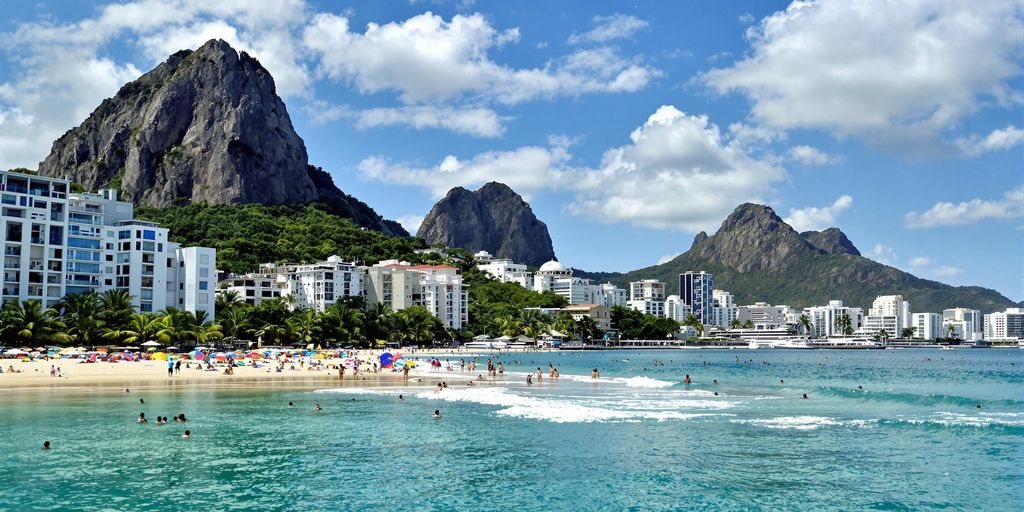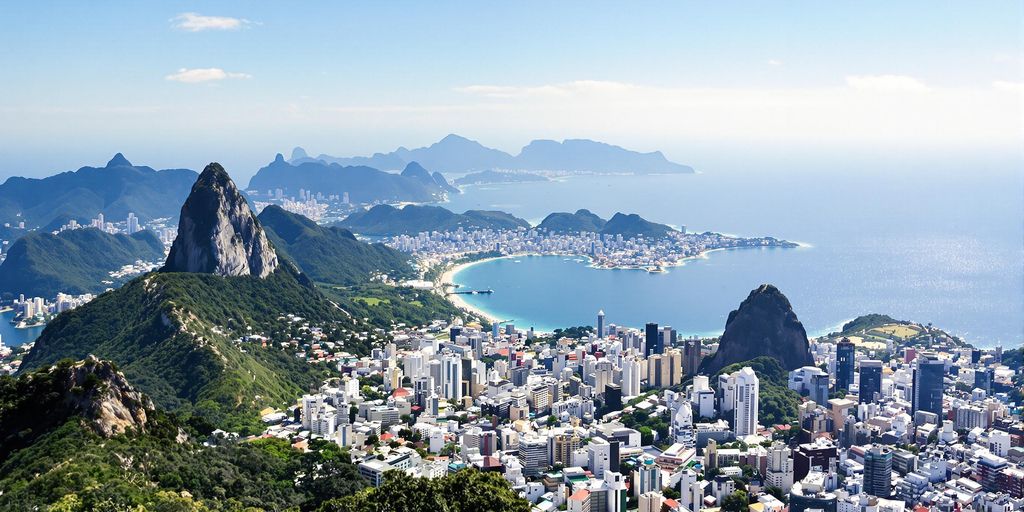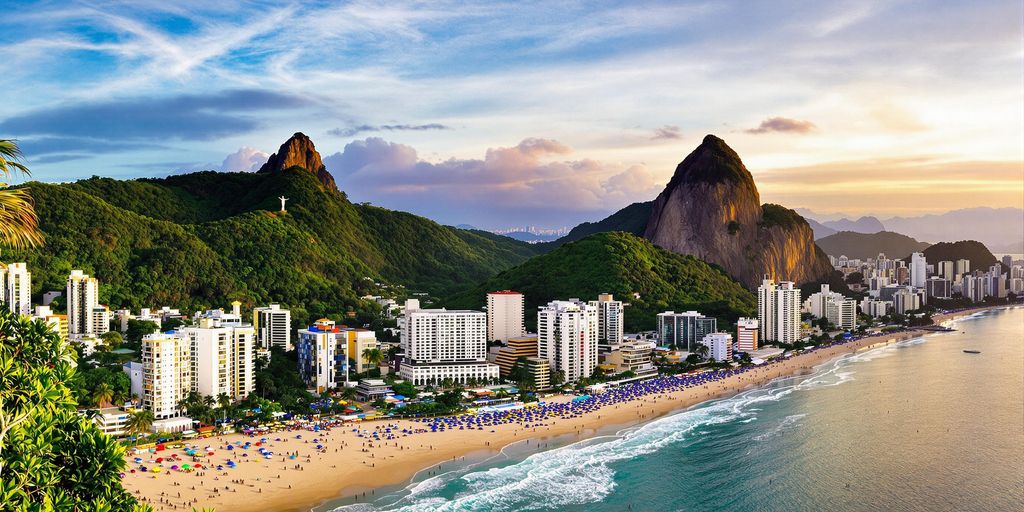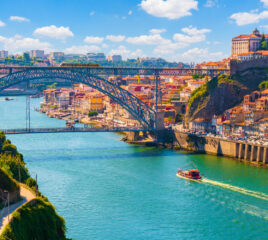Note that iPhone devices from Mainland China aren’t eSIM compatible. Also iPhone devices from Hong Kong and Macao aren’t compatible (except for iPhone 13 Mini, iPhone 12 Mini, iPhone SE 2020 and iPhone XS)
Rio de Janeiro, Brazil’s vibrant coastal city, is a destination that blends stunning natural landscapes with rich cultural experiences. From world-renowned landmarks to hidden treasures waiting to be discovered, this guide will take you on an unforgettable journey through Rio.
Iconic Landmarks of Rio de Janeiro
Christ the Redeemer: A Symbol of Faith and Art
Towering over Rio de Janeiro from the peak of Mount Corcovado, Christ the Redeemer is more than just a statue; it’s a global symbol of faith and artistry. Standing at 98 feet tall, with outstretched arms spanning 92 feet, this Art Deco masterpiece is a marvel of engineering and creativity. Designed by Brazilian engineer Heitor da Silva Costa and sculpted by French artist Paul Landowski, the statue was completed in 1931. Visitors can reach the summit by train or hike through the lush trails of Tijuca National Park, where the statue offers sweeping views of the city below. Pro tip: Arrive early in the morning or late in the afternoon to avoid the crowds and catch the best light for photos.
Sugarloaf Mountain: Panoramic Views of the City
Sugarloaf Mountain, or Pão de Açúcar as the locals call it, is another must-see landmark in Rio. Rising 1,299 feet above the harbor, this granite peak offers some of the most breathtaking views of the city, Guanabara Bay, and the Atlantic Ocean. The journey to the top is an adventure in itself, involving two cable cars—one to Morro da Urca and another to Sugarloaf’s summit. Each ride offers a unique perspective of Rio’s coastline and urban sprawl. Once at the top, you’ll find viewing platforms perfect for taking in the scenery, especially at sunset. Pack a pair of binoculars if you’re into birdwatching, as the area is home to several species.
Jardim Botânico: A Tropical Oasis
Escape the hustle and bustle of the city at Rio’s Jardim Botânico, a sprawling botanical garden established in 1808. This tropical sanctuary is home to over 6,000 species of plants, including towering imperial palms, vibrant orchids, and exotic bromeliads. The garden is also a haven for wildlife, with toucans, monkeys, and capybaras often spotted among the greenery. Highlights include the Avenue of Royal Palms, the Amazonian Victoria Regia water lilies, and the Orchidarium. Whether you’re a botany enthusiast or just looking for a peaceful retreat, the Jardim Botânico offers a serene escape. Don’t forget to visit the Japanese Garden and the sensory garden for a truly immersive experience.
Exploring Rio’s Vibrant Neighborhoods
Lapa: The Heart of Samba and Nightlife
Lapa pulses with energy, especially after sunset. This neighborhood is where samba comes alive, with music spilling out from bars and clubs onto the streets. The iconic Lapa Arches, a historic aqueduct, is the centerpiece of the area and a great starting point for your evening. Street vendors sell caipirinhas, Brazil’s famous cocktail, while locals and visitors dance the night away. If you’re into live music, the bars here offer an incredible range—from traditional samba to modern Brazilian beats. Don’t leave without snapping a photo at the Escadaria Selarón, a colorful mosaic staircase that’s become a symbol of Rio’s artistic spirit.
Leblon: Chic and Sophisticated Vibes
Leblon exudes elegance. Known as one of Rio’s most affluent neighborhoods, it’s the place to go for upscale dining, boutique shopping, and quieter beach scenes. The beach here feels less crowded than its famous neighbors, Copacabana and Ipanema, making it perfect for a relaxed day by the water. The streets are dotted with gourmet restaurants and trendy cafes, where you can sip on freshly brewed coffee or enjoy a decadent dessert. Don’t miss Rua Dias Ferreira, a street lined with some of the city’s best eateries—ideal for a leisurely dinner after a day in the sun.
Santa Teresa: Bohemian Charm and Art
Perched on a hill, Santa Teresa feels like stepping into another world. This historic neighborhood is a haven for artists, with its cobblestone streets, colorful murals, and quirky galleries. A ride on the Santa Teresa tram is a must—it’s one of the oldest transportation systems in the city and offers stunning views as it winds through narrow streets. Once you’re there, explore the art studios, grab a bite at a cozy cafe, or simply wander around to soak in the bohemian atmosphere. The Largo dos Guimarães area is a great spot to start your exploration, with its mix of restaurants, bars, and cultural spaces. It’s a neighborhood that feels like a living, breathing canvas.
Stay Connected in Rio!
Get a Brazil eSIM for fast, reliable data. No SIM swaps, no hassle.
Hidden Gems Worth Discovering
Largo do Boticário: Colonial Architecture and History
Tucked away in the Cosme Velho neighborhood, Largo do Boticário is like stepping back in time. This charming square is surrounded by beautifully preserved colonial-style houses, their pastel facades often framed by lush greenery. It’s a peaceful spot to wander around and imagine what life might have been like in the Rio of centuries past. While some of the buildings have seen better days, their historic charm is undeniable. Bring a camera—this place is a hidden gem for architecture lovers.
The Maze: A Bar with Stunning Views
The Maze isn’t just a bar; it’s an experience. Perched high in the Tavares Bastos community, this spot offers jaw-dropping views of Guanabara Bay and the city skyline. Known for its jazz nights, The Maze attracts both locals and visitors looking for a laid-back atmosphere with a side of live music. The maze-like layout of the venue adds to its quirky charm. It’s a bit off the beaten path, but the unique vibe and unbeatable views make it well worth the trip.
Joatinga Beach: A Secluded Paradise
If you’re looking to escape the crowds of Copacabana and Ipanema, Joatinga Beach is your go-to spot. Nestled between rocky cliffs, this small beach is a favorite among locals who want a quieter, more intimate setting. The tricky part is getting there—access involves navigating a steep path, but once you arrive, you’re rewarded with crystal-clear waters and soft sand. It’s a great place to unwind, soak up the sun, or even try your hand at surfing if the waves are right. Just keep an eye on the tide; the beach can disappear at high tide!
Breathtaking Lookout Points

Chinese View: Panoramic Cityscapes
The Chinese View, or “Vista Chinesa,” is one of Rio’s most picturesque spots, tucked away in the Tijuca National Park. It’s not as crowded as some of the city’s other viewpoints, making it a serene escape. From here, you can see iconic landmarks like Sugarloaf Mountain, Christ the Redeemer, and even parts of Ipanema and Leblon beaches. The wooden pagoda-style structure adds a unique charm to the experience. If you’re into photography, this spot is a goldmine, especially during sunrise or sunset.
Mirante do Joa: Coastal Beauty
Mirante do Joa is a hidden gem for those who love the ocean. Overlooking the coastline, this viewpoint offers a breathtaking panorama of rocky cliffs meeting the endless blue sea. It’s a favorite among locals for its peaceful vibe, and it’s a great place to bring a picnic or simply relax. If you’re lucky, you might even spot surfers catching waves at the nearby beaches. The spot is a bit off the beaten path, but that’s part of its charm.
Mirante do Pasmado: Unique Perspectives
Located in the Botafogo neighborhood, Mirante do Pasmado provides a unique perspective of Rio’s urban and natural landscapes. From this vantage point, you can see the iconic Sugarloaf Mountain framed by the city’s bustling streets and tranquil waters of Guanabara Bay. It’s a quieter alternative to the more famous viewpoints and is perfect for anyone looking to enjoy a moment of calm while still soaking in Rio’s beauty. There’s even a small park nearby if you want to extend your visit.
Rio’s Cultural and Artistic Treasures
Ethnicities Mural by Kobra: A Celebration of Diversity
This massive mural, created by renowned Brazilian street artist Eduardo Kobra, is a bold and colorful tribute to the diversity of human culture. Located in Rio’s Port Zone, the mural spans over 32,000 square feet and features the faces of five indigenous people from different continents, symbolizing unity and connection. It’s an unmissable stop for art lovers or anyone who enjoys striking visuals. Take your time to admire the intricate details and vibrant hues, and maybe even learn a bit about the artist’s message of inclusion and harmony.
Portuguese Library: A Literary Gem
Step into the Real Gabinete Português de Leitura and prepare to be amazed. The library, often called one of the most beautiful in the world, is a treasure trove for book lovers and history buffs alike. Its walls are lined with over 350,000 volumes, including rare manuscripts and first editions. The neo-Manueline architecture, with intricate woodwork and stained glass windows, makes it feel like you’ve stepped into another era. Even if you’re not a reader, the sheer grandeur of the space is worth the visit.
St. Benedict Monastery: A Historical Marvel
Tucked away from the city’s hustle, the St. Benedict Monastery is a serene escape and a masterpiece of baroque design. Built in the 17th century, the monastery is adorned with gilded wood carvings and intricate details that reflect the craftsmanship of the time. Visitors can attend a Gregorian chant service or simply wander around to soak in the peaceful atmosphere. It’s a place where history, art, and spirituality come together in perfect harmony.
Outdoor Adventures in Rio
Hiking in Tijuca National Park
Tijuca National Park is a sprawling green sanctuary right in the middle of Rio. It’s perfect for anyone who loves nature and wants to escape the hustle of the city. The park is home to several hiking trails, ranging from easy walks to more challenging climbs. One of the most popular trails leads to Pico da Tijuca, the park’s highest peak, where you’ll be rewarded with sweeping views of the city. Along the way, you might spot monkeys, toucans, and other wildlife. Make sure to bring water, wear sturdy shoes, and don’t forget your camera—this place is a photographer’s dream.
Exploring Hidden Waterfalls
If waterfalls are your thing, you’re in for a treat. Tijuca National Park is dotted with small, secluded waterfalls that are perfect for a refreshing dip. The Cascatinha Taunay is one of the most famous, but there are plenty of lesser-known spots if you’re up for a bit of exploring. These hidden gems are often surrounded by lush vegetation, making them feel like your own private paradise. Just remember, some trails to these waterfalls can be slippery, so tread carefully.
Parque Lage: Nature and Art Combined
Parque Lage is a unique blend of natural beauty and artistic charm. Nestled at the foot of Corcovado Mountain, this park features beautiful gardens, walking trails, and even a historic mansion that now houses an art school. It’s a great spot for a leisurely stroll or a picnic. The café inside the mansion offers a relaxed vibe and is a favorite among locals and tourists alike. Don’t miss the chance to explore the trails that wind through the park—they offer a peaceful escape and stunning views of the surrounding area.
Your Travel, Your Data, Your Way!
Skip the local SIM hunt—activate your Brazil eSIM in minutes and stay connected..
World-Famous Beaches of Rio

Copacabana: The Iconic Beachfront
Copacabana is probably the first beach that comes to mind when you think of Rio. Stretching for about 2.5 miles, this beach is not just a sandy retreat but a cultural hub. The famous promenade, with its black-and-white wave pattern, is always buzzing with activity. Whether it’s beach volleyball, soccer matches, or just people soaking up the sun, there’s always something happening. If you’re visiting in February, the Carnival in Brazil often spills over onto the sands, adding an extra layer of excitement.
Ipanema: Trendy and Picturesque
Right next to Copacabana, Ipanema offers a slightly different vibe. Known for its upscale atmosphere, this beach attracts both locals and tourists looking for a chic spot to relax. The sunsets here are legendary, with people often clapping as the sun dips below the horizon. Ipanema is also divided into “postos” or sections, each catering to different crowds—families, surfers, or the LGBTQ+ community. Sundays are particularly lively, with the nearby Hippie Fair offering unique crafts and souvenirs.
Barra da Tijuca: A Surfer’s Haven
For those who want to escape the hustle and bustle of the more central beaches, Barra da Tijuca is a fantastic option. This beach is the longest in Rio, stretching over 11 miles. It’s a favorite among surfers due to its consistent waves and less crowded shores. The surrounding area is also home to some of Rio’s modern shopping malls and dining spots, making it a great place to spend the entire day. If you’re up for an adventure, the nearby Reserva Beach offers an even quieter experience, perfect for unwinding.
Savoring Rio’s Local Cuisine
Feijoada: Brazil’s National Dish
No visit to Rio is complete without trying feijoada. This hearty black bean stew, traditionally cooked with pork cuts, is more than just a meal—it’s a cultural experience. Served with rice, collard greens, orange slices, and farofa (toasted cassava flour), feijoada is a dish best enjoyed slowly, often during a long lunch with friends or family. Many restaurants in Rio serve feijoada on Wednesdays and Saturdays, so plan accordingly. If you’re looking to savor authentic Brazilian food in a lively atmosphere, this dish is a must-try.
Pão de Queijo: A Cheesy Delight
Pão de queijo, or cheese bread, is a beloved Brazilian snack that’s hard to resist. These bite-sized balls are made from tapioca flour and cheese, giving them a chewy texture and rich flavor. Perfect for breakfast or as an afternoon snack, they pair wonderfully with a strong cup of Brazilian coffee. You’ll find pão de queijo at bakeries, street stalls, and even in supermarkets, but the freshly baked ones are the best. They’re simple yet incredibly satisfying.
Best Spots for Authentic Brazilian Food
Rio offers countless places to dive into its culinary scene, from cozy botecos (local bars) to high-end restaurants. Here are some types of spots you shouldn’t miss:
- Botecos: These casual eateries are great for trying petiscos (Brazilian tapas) and sipping on a chilled beer or caipirinha.
- Churrascarias: Brazilian steakhouses where you can enjoy a rodízio-style meal, with waiters bringing an endless variety of grilled meats to your table.
- Street Food Stalls: For a quick and tasty bite, try pastel (fried pastry with various fillings) or tapioca (a kind of crepe made from cassava flour).
Exploring Rio’s food scene is like taking a delicious journey through its culture. Whether you’re indulging in a traditional feijoada, nibbling on pão de queijo, or discovering the city’s vibrant dining spots, every bite tells a story.
Day Trips from Rio de Janeiro

Ilha Grande: An Island Escape
Picture a tropical island with lush forests, crystal-clear waters, and no cars. That’s Ilha Grande for you. Just a couple of hours from Rio, this island is perfect for anyone craving a break from the city’s buzz. You can take a ferry from Angra dos Reis or Mangaratiba to get there. Once you’re on the island, don’t miss hiking trails like the one to Lopes Mendes Beach—often ranked as one of the most beautiful beaches in the world. Snorkeling, kayaking, or just lounging in the sun are all on the menu here. Keep in mind, it’s a car-free zone, so bring comfy shoes and be ready to walk or bike.
Petrópolis: The Imperial City
If history is more your thing, Petrópolis is a must-visit. Known as the Imperial City, it’s where Brazil’s royal family used to escape the summer heat. Located about an hour and a half from Rio, this mountain town is full of charm. The highlight? The Imperial Museum, which used to be the summer palace of Emperor Dom Pedro II. You’ll also find quaint streets lined with old-world architecture, cozy cafes, and plenty of spots to try local treats like pão de mel (honey bread). Oh, and if you’re into hiking, the Serra dos Órgãos National Park nearby offers some incredible trails.
Angra dos Reis: A Coastal Gem
Angra dos Reis isn’t just a destination—it’s a gateway to over 300 islands. This coastal town, about two hours from Rio, is all about turquoise waters and lush greenery. Most people come here for boat tours that take you island-hopping. Ilha Grande is technically part of this area, but Angra has its own vibe. You can visit private beaches, snorkel in hidden coves, or even rent your own boat for the day. Pro tip: Try to plan your visit during the week to avoid the weekend crowds.
Insider Tips for Exploring Rio

Navigating the City Safely
Rio de Janeiro is a bustling, vibrant city, but like any major urban area, it’s important to stay aware of your surroundings. Stick to well-lit and busy areas, especially at night. Avoid displaying valuables like jewelry or expensive gadgets. When using public transport, keep your belongings close and secure. If you’re unsure about a neighborhood, ask a local or your accommodation staff for advice before heading out.
Saving Money While Traveling
Traveling to Rio doesn’t have to break the bank. For starters, consider eating at local eateries instead of touristy restaurants—these places often serve up delicious, authentic food at a fraction of the cost. Use public transportation like buses or the metro to get around; they’re affordable and reliable. If you plan to visit multiple attractions, look into combo tickets or passes that offer discounts for bundled experiences. And don’t forget to bargain at street markets—it’s part of the culture!
Experiencing Rio Like a Local
To truly understand Rio, step away from the tourist hotspots and embrace the city like a local. Spend an afternoon at a neighborhood bar sipping on caipirinhas and chatting with residents. Visit a samba school to witness the energy and passion behind Brazil’s famous Carnival. On Sundays, join the locals at the Feira de São Cristóvão—a market full of food, music, and handcrafted goods. And if you’re up for it, catch a football match at Maracanã Stadium—it’s an unforgettable experience!
Wrapping Up Your Rio Adventure
Rio de Janeiro is a city that truly has it all—breathtaking landscapes, rich culture, and a mix of well-known attractions and hidden treasures. Whether you’re soaking up the sun on Copacabana, hiking through Tijuca Forest, or discovering tucked-away spots like Joatinga Beach or the Portuguese Library, there’s always something new to experience. The city’s vibrant energy and unique charm make it a place you’ll want to return to again and again. So pack your bags, keep an open mind, and let Rio surprise you at every turn.
Your Journey, Our eSIM
Stay online abroad with instant activation.
Seamless Mobile Data Everywhere
















